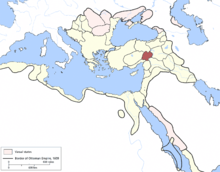Dulkadir Eyalet (Ottoman Turkish: ایالت ذو القادریه / دولقادر, romanized: Eyālet-i Ẕū l-Ḳādirīye / Ḍūlḳādir)[2] or Marash Eyalet (Turkish: Maraş Eyaleti) was an eyalet of the Ottoman Empire.
| Maraş Eyaleti | |||||||||||
|---|---|---|---|---|---|---|---|---|---|---|---|
| Eyalet of Ottoman Empire | |||||||||||
| c. 1527–1864 | |||||||||||
|
Flag | |||||||||||
 The Dulkadir Eyalet in 1609 | |||||||||||
| Capital | Marash[1] | ||||||||||
| History | |||||||||||
• Established | c. 1527 | ||||||||||
• Disestablished | 1864 | ||||||||||
| |||||||||||
History
editThe Dulkadirids were the last of the Anatolian emirates to yield to the Ottomans, managing to remain independent until 1521, and were not fully incorporated into the empire until 1530.[3]
It is unclear when the eyalet was formed. Ottoman historian Ibn Kemal explained that the territory formerly ruled by Ali was divided into five sanjaks with governors appointed by the central government with no mention of the appointment of a beylerbey. The province was described as vilayet, a region instead of an eyalet, by the 1526 icmal defter. A record, thought to be from 1527, listed Marash as part of Karaman Eyalet, while Bozok belonged to Rum Eyalet. Dulkadir Eyalet was likely established shortly after the grand vizier Pargalı Ibrahim Pasha extinguished the Kalenderoghlu revolt the same year and took administrative precautions to maintain order in the realm. Historian Celalzade attests to the beylerbey of Dulkadir in Tabakātü'l-memâlik in 1538.[4]
Administrative divisions
edit| Sanjaks | Former eyalet | Joined | Left | Later eyalet (or vilayet) | Note |
|---|---|---|---|---|---|
| Marash | Karaman | c. 1527[4] | 1850 | Adana | Capital sanjak.[5] |
| Aintab | Aleppo[6] | c. 1531 | 1818 | Aleppo[7] | |
| Bozok | Rum | c. 1531 | 1574 | Rum | Sporadically changed hands between Dulkadir and Rum Eyalet until its permanent transfer to the latter by 1574.[8] |
| Uzayr | Damascus | 1534 | 1553 | Aleppo[9] | |
| Tarsus | Aleppo | By 1538[4] | By Dec. 1549 | Karaman[10] | |
| Karaman | By Jan. 1559 | 30 July 1571 | Cyprus[10] | ||
| Sis | 1538–1548[4] | 30 July 1571 | Cyprus[10] | ||
| Malatya | Rum | 1559 | 1559 | Rum[11] | |
| Rum | 1568 | 1839 | Diyarbekir[11] | ||
| Kars | 1568–1574 | Before 1831 | |||
| Samsat | 1568–1574 | After 1831 | |||
| Gerger | 1831 |
Demographics
editIn the early 16th century, a significant portion of the province's population was composed of nomadic Turkmens of the Dulkadir tribe. According to the 1526 icmal defter, the region consisted of 69,481 households (approximately 350,000 people), 48,665 (about 245,000 people), 18,158, and 2,631 of whom were Dulkadir nomads, settled Muslims, and Christians, respectively. The region included 523 villages, 3412 hamlets, 62 farms, 64 kishlaks (winter pastures), and 35 yaylaks (summer pastures).[4]
The population of the eyalet increased in 1570–1580, when it housed 113,028 households (approximately 550,000 people), 70,368, 38,497, and 4163 of whom were settled Muslims, nomads, and Christians, respectively. Around those times, the province had 2169 sworded timars and 5500 levy. During the 17th century, it increased to 2869 sworded timar and 6800 levy.[4]
Notes
editReferences
edit- ^ Macgregor, John (1850). Commercial statistics. A digest of the productive resources, commercial legislation, customs tariffs, of all nations. Including all British commercial treaties with foreign states. Whittaker and co. p. 12. Retrieved 12 February 2024.
- ^ "Some Provinces of the Ottoman Empire". Geonames.de. Archived from the original on 28 September 2013. Retrieved 25 February 2013.
- ^ Gábor Ágoston; Bruce Alan Masters (1 January 2009). Encyclopedia of the Ottoman Empire. Infobase Publishing. p. 41. ISBN 978-1-4381-1025-7. Retrieved 26 June 2013.
- ^ a b c d e f Şahin 1994, pp. 552–553.
- ^ Gündüz 2001, pp. 192–196.
- ^ Peirce 2003, p. 28.
- ^ Peirce 2003, p. 27.
- ^ Açıkel 2008, pp. 225–226.
- ^ Ünlü 2020, p. 270.
- ^ a b c Bilgili 2011, pp. 111–114.
- ^ a b Göğebakan 2003, pp. 468–473.
Bibliography
edit- Açıkel, Ali (2008). "Rum Eyaleti". TDV Encyclopedia of Islam, Vol. 35 (Resûlîler – Sak) (in Turkish). Istanbul: Turkiye Diyanet Foundation, Centre for Islamic Studies. pp. 225–226. ISBN 978-975-389-457-9.
- Bilgili, Ali Sinan (2011). "Tarsus". TDV Encyclopedia of Islam, Vol. 40 (Tanzi̇mat – Teveccüh) (in Turkish). Istanbul: Turkiye Diyanet Foundation, Centre for Islamic Studies. pp. 111–114. ISBN 978-975-389-652-8.
- Göğebakan, Göknur (2003). "Malatya". TDV Encyclopedia of Islam, Vol. 27 (Kütahya Mevlevîhânesi̇ – Mani̇sa) (in Turkish). Istanbul: Turkiye Diyanet Foundation, Centre for Islamic Studies. pp. 468–473. ISBN 978-975-389-408-1.
- Gündüz, Tufan (2001). "Kahramanmaraş". TDV Encyclopedia of Islam, Vol. 24 (Kāânî-i Şîrâzî – Kastamonu) (in Turkish). Istanbul: Turkiye Diyanet Foundation, Centre for Islamic Studies. pp. 192–196. ISBN 978-975-389-451-7.
- Peirce, Leslie (2003). Morality Tales: Law and Gender in the Ottoman Court of Aintab. University of California Press. ISBN 9780520228924. OCLC 52471062. Retrieved 23 February 2023.
- Şahin, İlhan (1994). "Dulkadır Eyaleti". TDV Encyclopedia of Islam, Vol. 9 (Dârüsaâde – Dulkadi̇roğulları) (in Turkish). Istanbul: Turkiye Diyanet Foundation, Centre for Islamic Studies. pp. 552–553. ISBN 978-975-389-436-4.
- Ünlü, Ertan (25 December 2020). "Çukurova'da Bir Türkmen Ailesi: Özeroğulları". Journal of Turkish World Studies (in Turkish). 20 (2): 253–286. doi:10.32449/egetdid.811630 (inactive 1 November 2024). ISSN 2667-6729.
{{cite journal}}: CS1 maint: DOI inactive as of November 2024 (link)
